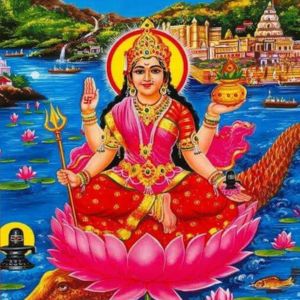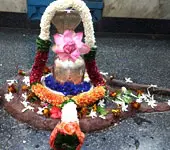Defining Goodness - Sanatana Dharma's Perspective
Transcript
(Click here to read more)
Are you a good person? Sanatana Dharma states that you are considered a good person if you possess ten specific qualities: धृतिः क्षमा दमोऽस्तेयः शौचमिन्द्रियनिग्रहः । धीर्विद्या सत्यमक्रोधो दशकं धर्मलक्षणम् ॥ If you have these 10 qualities, then you are a righteous person. Dhriti, kshama, dama, asteya, shaucham, indriyanigraha, dhee, vidya, satyam, akrodha. What are they?....
Transcript
(Click here)
Are you a good person?
Sanatana Dharma states that you are considered a good person if you possess ten specific qualities:
धृतिः क्षमा दमोऽस्तेयः शौचमिन्द्रियनिग्रहः ।
धीर्विद्या सत्यमक्रोधो दशकं धर्मलक्षणम् ॥
If you have these 10 qualities, then you are a righteous person.
Dhriti, kshama, dama, asteya, shaucham, indriyanigraha, dhee, vidya, satyam, akrodha.
What are they?
The first quality - dhriti.
Dhriti means stability, stable thoughts, stable attitude, and stable actions. Some people face the smallest obstacle and turn back, thinking, 'No, this will not work out; this is not my cup of tea.' They lack dhriti. If you have dhriti, you will face challenges, stay put, and fight. Running away from problems doesn't save you; it lands you in bigger trouble. You may lose self-confidence and end up being scared of taking even small steps. If you make a decision, stick to it. Do all your thinking before making the decision. Dhriti, of course, goes hand in hand with courage.
The second quality - kshama.
Even when you have the full capability to retaliate against an offender, remaining calm, not attacking, and tolerating is what kshama means. Kshama is a sign not of weakness but of strength. It's essential to remember that even if someone is causing you trouble, the root cause may be your own past karma.
The third quality - dama.
Dama means mind control. Controlling the mind and controlling the senses are two different things. For instance, if a boy is sitting to study and hears music from the neighborhood, getting distracted, it's because he doesn't have control over his sensory organs, specifically his ears. However, if he reaches out for his mobile phone, it's a lack of mind control, as he initiates the distraction. Dama is essential for achieving anything in life and not getting distracted from your tasks.
The fourth quality - asteya.
Even though asteya literally means not to steal, the term has much wider implications. Taking anything that doesn't belong to you is stealing, whether it's wealth, position, credit, or infringing on somebody's copyright or intellectual property. Evading taxes, shortchanging, adulteration, tampering with weights and measures - all are forms of stealing. Taking a fee and not delivering what is expected of you is also stealing.
The fifth quality - shaucham.
Hygiene, cleanliness, not just in terms of physical hygiene but also mental purity. To make your mind pure, eliminate lust, anger, greed, ignorance, pride, and the tendency to compete. Both external and internal purity are equally important.
The sixth quality - indriyanigraha.
If you have filters installed in all your sensory organs, then you have indriyanigraha. If you see only what should be seen, not everything that your eyes show you, then you have indriyanigraha. If you hear only what should be heard, not everything that reaches your ears, then you have indriyanigraha. If you have indriyanigraha, you will not eat anything and everything that your tongue desires; you will eat only what is good for your body. You might love a bottled perfume, but if it is harmful to your body, you will not use it. A cozy bed may be nice to sleep on, but in the long run, if it is going to give you back pain, you will not use it. Indriyanigraha means you will not allow your sensory organs to rule your life or decide what you do.
The seventh quality - dhee - intelligence.
People are born with different intellectual potential, but you can also develop intelligence. Reading exposes you to new ideas, vocabulary, and perspectives, boosting comprehension, critical thinking, and knowledge. Engaging in stimulating conversations—discussing complex topics with knowledgeable people sparks new ideas, challenges your assumptions, and broadens your perspective. Even listening to such conversations helps. Learning something new challenges your brain and creates new neural pathways—learning a new language, musical instrument, skill, or subject. There are brain-training games; games like puzzles, Sudoku, crosswords, and memory games can improve specific cognitive skills like memory, reasoning, and visuospatial abilities. Act intelligently rather than reacting to situations.
The eighth quality - vidya.
Knowledge, education, enhances critical thinking and problem-solving skills. It equips you to analyze information, evaluate options, and make informed decisions. It boosts creativity and innovation. Knowledge and education encourage exploration, experimentation, and the development of new ideas and solutions. Knowledge and education strengthen memory and cognitive function, stimulate brain activity, improve learning capacity, and promote lifelong mental agility. They increase self-confidence and self-esteem: Knowledge empowers you to navigate challenges, pursue goals, and feel more capable. Education broadens your perspective and worldview, exposes you to diverse cultures, ideas, and viewpoints, fostering understanding and empathy. Knowledge and education provide financial literacy and stability, leadership potential, promote civic responsibility and social awareness, and also break down barriers, promote tolerance, and build bridges between diverse groups in society.
The ninth quality - satyam, honesty, truthfulness in both words and deeds.
Truthful words and deeds are simple and straightforward. This itself is divinity. If you are honest, you don't have to carefully craft words like drafting a legal document; you don't have to camouflage your intentions. It is easy and simple. But honest people do not deviate from honesty even in great challenges and grave dangers.
The tenth quality - akrodha
Anger is self-injurious. It is more injurious to oneself than to others. It is like acid that corrodes the vessel in which it is kept. Most crimes are committed under the influence of anger. When angry, a son doesn't hesitate to harm his parents, a husband doesn't hesitate to harm his wife, protesters don't hesitate to destroy public property. So akrodha or not getting angry, keeping your temper under control is very important.
The practices in Sanatana Dharma are meant to develop these ten qualities in you, making you a good person.
Recommended for you
How To Find Out Whether You Have Bhakti

This audio discourse which is part of Bhagavata series tells you how to find out whether you have bhakti.....
Click here to know more..Mantra For Protection From Snakebite

नर्मदायै नमः प्रातः नर्मदायै नमो निशि। नमोऽस्तु नर्मदे �....
Click here to know more..Shiva Shatka Stotram

anusri'tasajjana- sanmahaanukampam shivamatha bhootadayaakaram bhaje'ham.....
Click here to know more..
English Topics
Rare Topics
Click on any topic to open
- 237 The Practice of Bhojana Sadhana
- 236 Words of Wisdom - 2
- 235 Defining Goodness - Sanatana Dharma's Perspective
- 234 Vibhishana in Ramayana - A Tale of Morality, Loyalty, and Redemption
- 233 God will not let you break
- 232 A Glimpse into the 64 Arts
- 231 Chembai Vaidyanatha Bhagavatar - A Carnatic Maestro's Musical Odyssey
- 230 Understanding Adhyāsa: A Closer Look at False Attribution
- 229 Is Family's Permission Necessary For Becoming Sanyasi ?
- 228 Faith In Upasana
Please wait while the audio list loads..
30
Ganapathy
Shiva
Hanuman
Devi
Vishnu Sahasranama
Mahabharatam
Practical Wisdom
Yoga Vasishta
Vedas
Rituals
Rare Topics
Devi Mahatmyam
Glory of Venkatesha
Shani Mahatmya
Story of Sri Yantra
Rudram Explained
Atharva Sheersha
Sri Suktam
Kathopanishad
Ramayana
Mystique
Mantra Shastra
Bharat Matha
Bhagavatam
Astrology
Temples
Spiritual books
Purana Stories
Festivals
Sages and Saints
